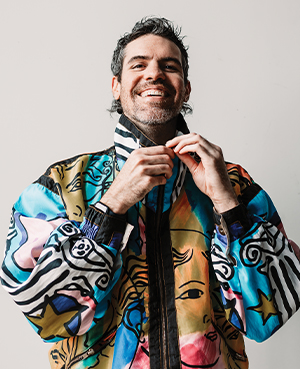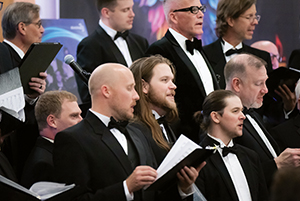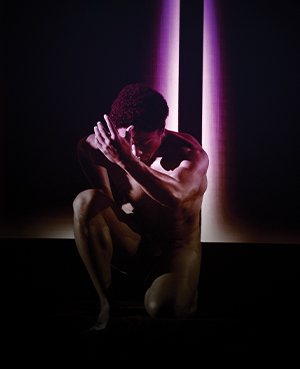The painter John Singer Sargent (Thomas Glenn), left, danced with his model and muse, Thomas McKeller (Justin Austin), in a 2022 preview of “American Apollo,” a new show from Des Moines Metro Opera. Photo: Duane Tinkey
Writer: Brianne Sanchez
Love — specifically, LGBTQ love — will be in the spotlight this year when three local arts organizations bring several new commissions to stages here in Central Iowa. A new ballet, an original opera and several fresh choral works will invite audiences to consider the queer experience with empathy and to celebrate LGBTQ contributions to the community at large.
“In this day and age, especially in this state, we have lots of forces working against us,” said Eric Shepard, artistic director for the Des Moines Gay Men’s Chorus. “As people are trying to dehumanize the LGBTQ population and, more specifically, our trans and nonbinary youth, we’ve been trying to find ways to tell those stories.”
Some of those storytelling techniques have been around for centuries. But the new companies are breathing new life into classical forms.
“There is a certain amount of courage that’s involved in presenting new works and not relying on standard repertory,” said Michael Egel, the general and artistic director of Des Moines Metro Opera. “I think that’s exciting and interesting. It keeps the art form vital, and it keeps our companies vital.”
The performing arts groups hope their new works will inspire audience members on an artistic level and, perhaps, motivate them to become allies and advocates.

Ballet Des Moines’ artistic director, Tom Mattingly, choreographed “Love Letters” with inspiration from the real thing: stories about LGBTQ Iowans, told in their own words. Photo: Jami Milne
Ballet Des Moines “Love Letters”
Premiering March 8 and 9
Hoyt Sherman Place
Like a handwritten note tucked in the pages of a book, Ballet Des Moines will present a brand-new work in its annual spring show. The triple bill starts with dances by legendary choreographers George Balanchine and Christopher Wheeldon before the world premiere of “Love Letters” by Tom Mattingly, the company’s artistic director.
“For me, ‘Love Letters’ really sprang from the idea of wanting to create a ballet for and by the queer community in Iowa,” said Mattingly, who joined the company in 2021.
He said the chance to stretch creatively with these kinds of projects was one of the reasons he came to Des Moines. “I felt like I had the opportunity to have a hand in creating something and growing something,” he said. “Giving time and love and effort to any type of arts organization — it’s never easy — but when you’re surrounded by people who have your back, there’s so much that can be accomplished together.”
The original piece is inspired by crowdsourced stories the ballet company collected with help from One Iowa, the nonprofit group that promotes LGBTQ equality. They invited Iowans to contribute reflections through a survey that offered a series of prompts about their personal experiences — their joy, their isolation, their families of biology and choice.
Mattingly read all the submissions and then figured out how “to translate the stories that people shared and, even more importantly, the feelings and the emotions.” He matched the music to a message about finding self-acceptance and connecting to a community.
The “Love Letters” score shifts from classical to contemporary. Mattingly reached out to Rod Thomas, a Welsh singer-songwriter better known as Bright Light Bright Light, who lives in New York and has toured with Elton John. He gladly gave Ballet Des Moines permission to use one of his songs, which features tender vocals, piano and a synthy dance beat more often heard in a club than a classical ballet.
“Dance is such an incredible vehicle for emotions,” the choreographer said. “There’s something really powerful about the physicality of the human body and how it moves, how body language and different bodies influence each other.”

The Des Moines Gay Men’s Chorus’ mission to sing “music that matters” includes several new commissions, including arrangements of some Kelly Clarkson hits. Photo: Jonathan Dwight Photography
Des Moines Gay Men’s Chorus “United In Song”
Premiering June 14 and 15
Temple for Performing Arts
The Des Moines Gay Men’s Chorus is entering a new era, but its mission to perform “music that matters” continues. In his second season as artistic director, Eric Shepard has made it a priority to present at least one new commission — either a new composition or a new arrangement — at every concert. The chorus plans to reprise these works at a festival in July in Minneapolis, among more than 200 LGBTQ choruses from around the world.
“It will be a culmination of two years of brand-new commissions,” Shepard said. We’re “telling the stories of the LGBTQ+ community now, focusing on our common humanity and how we can be the role models we didn’t have.”
At their spring concert March 22 and 23, the chorus will sing a 15-song suite that spans Kelly Clarkson’s career. It was specially arranged for the chorus by Ben Wexler, who earned a 2020 Special Tony Award as the founding artistic director of the Broadway Advocacy Coalition.
In June, the chorus will premiere a piece called “Keep Going” by composer Carlos Cordero, which the chorus co-commissioned with the Turtle Creek Chorale in Dallas. It was inspired by “It Gets Better,” the ongoing project to encourage and uplift LGBTQ youths, and articulates a call to reach out for connection and a reminder to be kind.
The chorus is working with Wexler on additional pieces that may be part of the chorus’ second annual Youth Festival Chorus, which Shepard said will help young people prepare “for a tomorrow that’s better than we could envision for ourselves.” As he put it, “A young person cannot be an empowered LGBTQ leader of the future without seeing folks like we have in our chorus. So we want to showcase those stories so people can see themselves in the work that we produce and, frankly, provide a little bit of hope for what’s to come.”
The new songs stem from personal experiences of older LGBTQ folks who lived through the AIDS crisis, as well as others who have recently welcomed children into their lives. The chorus is more diverse than ever, and a third of its 80-some members are trans, nonbinary or cisgendered women. To honor that recent growth and ongoing community outreach, Bravo Greater Des Moines plans to bestow its annual Spotlight Award on the chorus at the Bravo Awards Gala on Feb. 3.
“I don’t think it’s a coincidence that our membership has expanded so much in the last couple of years,” said Liz Cooney, the first female president of the chorus’ board. “There’s a direct correlation between the words we’re singing and how that is connecting with people on such a deep, visceral level of the need to belong, the need to feel safe, the need to make change in our community right now.”

Baritone Justin Austin plays a Boston man named Thomas McKeller, who inspired famous paintings and the new opera “American Apollo.” Photo: Duane Tinkey
Des Moines Metro Opera “American Apollo”
Premiering July 13 and 18
Blank Performing Arts Center, Indianola
This summer the curtain will rise on “American Apollo,” a new opera that opens a window into art history and a look at an intimate relationship between a famous painter and his muse.
The creative team drew inspiration from a series of recently rediscovered sketches and paintings that John Singer Sargent made of Thomas McKeller, a Black elevator attendant who served as the artist’s principal model and is thought to have been his lover. Sargent used McKeller’s figure in studies for most of the gods and goddesses he depicted as white in murals painted for Boston’s Museum of Fine Arts between 1890 and 1919.
“While the setting is historical, the themes in the story are timeless and very much of the current zeitgeist,” said Michael Egel, the Des Moines Metro Opera’s general and artistic director. “It’s an interracial love story that touches on queer culture, celebrity, class strife — all things that we’re still talking about.”
More than two years in the making, the idea for “American Apollo” originated within the American Opera Initiative. The composer Damien Geter, who is Black, was paired with the librettist, Lila Palmer, who is white, to collaborate on a short piece in 2020.
They drew inspiration from an exhibition at the Isabella Stewart Gardner Museum in Boston, which used Sargent’s images of McKeller to explore the erasure of Black identity in American culture. “American Apollo” examines the professional and romantic relationship between the artist and the model, coloring in the outlines of historical facts with well-researched speculation.
“What would it have been like to be in that room while they were getting to know one another?” Egel said. “When you look at the sketches of Thomas McKeller that were unearthed as part of this exhibit, they’re arresting, they’re sensual. To know that this isn’t just a sitter/artist relationship, it comes off the page as something very touching and very beautiful.”








